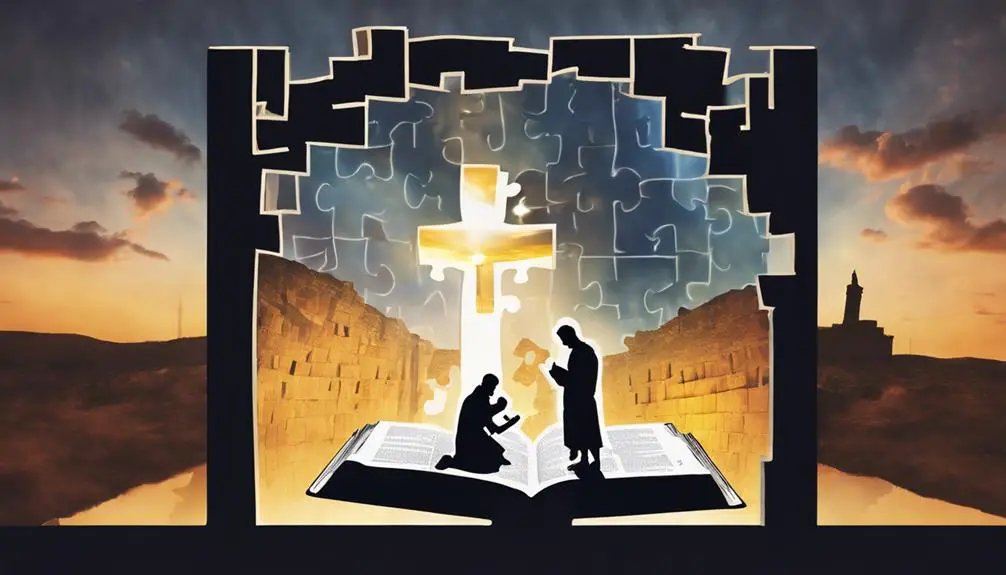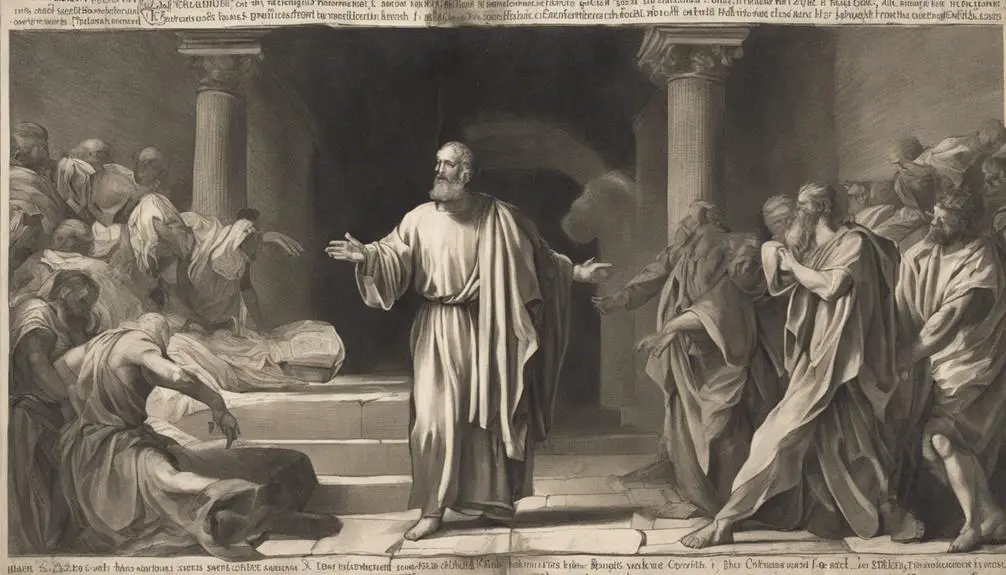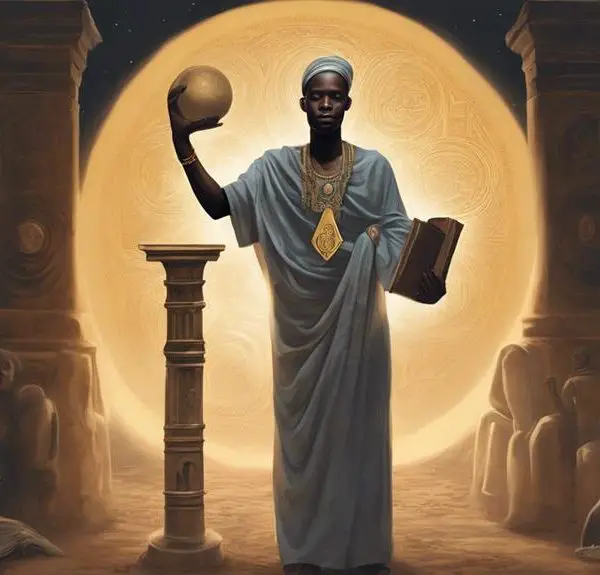Wander through intriguing Biblical tales of lost identities and uncover what they reveal about our personal quests for self-understanding.

Who Lost Their Identity in the Bible
If you've ever felt like you've misplaced your keys, spare a thought for those who've lost their entire identities, if we look at the Bible. You'll find intriguing tales of transformation and identity loss, from Saul's shocking conversion on the road to Damascus, to Jacob's wrestling match that left him with a new name and a limp.
Who, then, lost their identity the most? And what might their journeys reveal about our own quests for self-understanding? As we explore deeper, you might just find yourself identifying with these age-old narratives more than you'd expect.
Key Takeaways
- Saul, Jacob, the Prodigal Son, Mary Magdalene, and Peter experienced significant identity losses in the Bible.
- These individuals underwent profound transformations, often sparked by divine intervention or personal revelation.
- Their stories illustrate how identity loss can lead to spiritual growth, redemption, and renewed purpose.
- Despite their past, each character's transformation showcases the capacity for change and the power of faith.
The Transformation of Saul

The transformation of Saul into Paul, a profound example of identity loss in the Bible, challenges us to delve deeper into the complexities of personal change and spiritual evolution. Saul's conversion wasn't a mere name change; it represented a complete spiritual transformation and re-orientation of his life purpose.
Despite Saul's initial reputation as a fierce persecutor of Christians, his dramatic conversion on the road to Damascus altered his trajectory, leading him to become one of Christianity's most ardent advocates. This event, known as Saul's conversion, is pivotal in understanding the depth of his transformation. It wasn't a gradual shift; instead, it was a sudden, radical change. One moment, he's a fervent persecutor; the next, a staunch believer.
Paul's ministry, the post-conversion phase of his life, was characterized by passionate commitment to spreading the Gospel. His letters in the New Testament reflect his evolved identity and provide insight into his new-found zeal. They bear witness to the transformative power of faith and an individual's potential for change.
Through Saul's conversion and Paul's ministry, we learn that identity isn't static but can be refined, reshaped, and redefined through deeply personal and spiritual experiences.
Jacob's Journey to Israel

Embarking on Jacob's journey to Israel, you encounter another remarkable instance of identity shift in the Bible, as Jacob, the trickster, evolves into Israel, the one who wrestles with God. Jacob's deception, his stealing of Esau's blessing, sets the stage for this transformation.
As you delve deeper, you'll uncover:
- Jacob's deceiving nature that leads him to trick his brother Esau and father Isaac
- His dream interpretation at Bethel, where he sees a ladder reaching to heaven
- His wrestling match with a divine being, leading to his name change
- His transformation into Israel, embodying a new identity and purpose
Jacob's dream interpretation is pivotal, marking a turning point in his life. His vision of a ladder reaching to heaven, with angels ascending and descending, signifies his divine appointment. He's no longer just a trickster; he's on a mission from God.
Following Jacob's wrestling with the divine entity, he's renamed Israel, 'he who strives with God'. This name change isn't just a label; it's a new identity. It reflects his struggles, his spiritual growth, and his new-found purpose. In Israel, Jacob's deceptive past is overshadowed by his divine future.
The Prodigal Son's Return

Moving from Jacob's transformative journey, let's now turn our attention to the tale of the Prodigal Son, another poignant example of identity loss and subsequent rediscovery in the Bible. You'll find this narrative, steeped in repentance symbolism, in Luke 15, where a young man leaves his father's house, squanders his inheritance, and then returns home, seeking mercy.
The Prodigal Son's return represents more than just physical journeying; it's a symbolic trek from selfishness to self-awareness, from indulgence to repentance. His initial departure is a rejection of his family's values, and his reckless lifestyle mirrors this identity loss. However, in his direst moment, he reevaluates his choices and resolves to return home, representing his spiritual transformation.
The climactic reunion with his father embodies familial reconciliation. The father, instead of chastising him for his mistakes, embraces his son, signifying forgiveness and acceptance. This act underlines a profound shift in the son's identity—from a prodigal, he's restored as a cherished family member.
The Prodigal Son's tale, therefore, offers a profound exploration of identity loss and regeneration, underlined by repentance symbolism and familial reconciliation. It's a testament to the transformative power of remorse and forgiveness in reclaiming lost identities.
The Metamorphosis of Mary Magdalene

Let's delve into the extraordinary transformation of Mary Magdalene, a figure whose evolution from a woman of questionable reputation to a devoted follower of Jesus serves as a stirring illustration of identity metamorphosis in the Bible. Her story is one of 'Magdalene's Redemption', a testament to the transformative power of faith and forgiveness.
- Mary Magdalene is initially introduced as a sinner, her reputation tarnished by her past.
- Jesus' forgiveness leads to her transformation, marking the beginning of 'Magdalene's Redemption'.
- She becomes one of the most 'Influential Women in the Bible', accompanying Jesus during his ministry.
- Post-resurrection, she's the first to see Jesus, solidifying her status among the disciples.
Her metamorphosis isn't just a personal journey; it's a wider commentary on the capacity for change and redemption. Regardless of her past, Mary Magdalene's faith allows her to redefine her identity, moving from outcast to disciple. Her story is a powerful reminder that no one is beyond redemption, and that often, the most profound changes arise from the deepest acts of faith.
Peter: From Fisherman to Apostle

Much like Mary Magdalene's transformative journey, Peter's life too underwent a dramatic change, going from a humble fisherman to one of the most revered apostles in the Bible. His transformation wasn't just personal but also spiritual, marking a significant shift in his life's purpose and direction.
This Apostle Transformation was marked by key life stages, each reflecting a different aspect of Peter's leadership and faith.
Here's a snapshot of Peter's life journey:
Life Stage |
Identity |
Key Influence |
|---|---|---|
Before Jesus |
Fisherman |
His profession |
Encounter with Jesus |
Follower |
Jesus's teachings |
After Jesus's death |
Apostle |
Jesus's legacy |
Establishment of the Church |
Leader |
His faith |
Martyrdom |
Saint |
His sacrifice |
Peter's leadership was not just about leading the early Christian community, but also about embodying the teachings of Jesus, demonstrating unwavering faith, and making the ultimate sacrifice for his beliefs. His transformation from an ordinary fisherman to a revered apostle symbolizes the transformative power of faith and commitment. It's a reminder that you too can make a difference, regardless of your background or past.
Frequently Asked Questions
How Did the Old Testament Characters Maintain Their Faith While Losing Their Identity?
You'd notice that Old Testament characters faced faith challenges while undergoing identity preservation. They maintained their faith through consistent prayer, obedience to God, and trust in His promises.
Even when their identities seemed lost in trials and tribulations, they held onto their faith, believing that God had a higher purpose. This unwavering belief was their anchor, keeping them grounded in their faith despite any seeming loss of identity.
Were There Any Significant Identity Changes in the Bible That Involved Women Other Than Mary Magdalene?
Yes, there were significant identity changes involving women in the Bible. Consider Rahab's transformation from a prostitute to an ancestor of Christ. Her faith and actions redefined her identity.
Also, Eve's influence extends beyond her role as the first woman. After succumbing to temptation, she became a symbol of humanity's fallibility.
Their stories show that identity in the Bible isn't static but can change based on faith, actions, and consequences.
How Do Modern Biblical Scholars Interpret the Concept of Identity Loss in Biblical Stories?
Modern biblical scholars use interpretive approaches to understand the concept of identity loss in biblical stories. They observe cultural contexts, historical events, and linguistic nuances to decode these narratives.
From such studies, you'll find identity loss often represents transformation or renewal. It's not necessarily a negative concept, but a pivotal point sparking personal growth and change.
This complex theme, thus, holds immense significance in biblical analysis.
Are There Any Instances of Characters Regaining Their Lost Identities in the Bible?
Yes, there are instances of identity restoration in the Bible. Most notably, the Prodigal Son. After squandering his inheritance, he returns home, expecting to be a servant. However, his father welcomes him back, restoring his identity as a beloved son.
This parable beautifully depicts the concept of lost and regained identity. It's a powerful example of forgiveness and unconditional love restoring a lost identity.
How Does the Theme of Identity Loss in the Bible Relate to Contemporary Issues of Identity and Self-Discovery?
You're often faced with an identity crisis in today's society, aren't you? The Bible's theme of lost identity can offer insight. You might see it as a metaphor for your own self-discovery journey.
It suggests that losing and rediscovering your identity is a part of life, and each struggle you face can bring self-growth. So, connect to these biblical stories to understand your unique journey better.
Conclusion
You've journeyed through Biblical tales of dramatic transformations, witnessing how Saul, Jacob, the Prodigal Son, Mary Magdalene, and Peter lost and rediscovered their identities. Each story emphasizes the power of change and redemption.
It's clear that losing one's identity isn't an end, but a transition, a chance for renewal. These narratives invite you to explore your own identity, and consider how challenges might lead to your own transformation.



Sign up